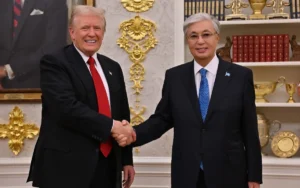Growing trend of Kazakh Tattoo Art

Astana, The Gulf Observer: Kazakh national symbols are emerging as a fresh trend in the world of tattoo art. Saltanat Kuanova, a tattoo artist from Almaty with around six years of experience, is a pioneer in this niche. She began inking tattoos in a traditional style long before it became mainstream.
“I found my style by my third year of work, but I created around 15 pieces featuring designs even before that. I did not think much of it at the time; my clients brought the idea to me,” Kuanova said in an interview for this story. “This was when the national identity was just beginning to gain recognition. As I shared my works online, I noticed they were receiving more likes and views. They sparked various reactions, from admiration to even some backlash. All sorts of brands and stores are attempting to incorporate it. I feel fortunate to have been able to tap into this trend early on.”
Foreign tourists and those relocating to the country are now getting traditional Kazakh tattoos to commemorate their time here.
“I would say Kazakhs make up about 70 percent of my clients. Over the past year, I have seen a lot of foreigners from the U.S., Spain, France, Israel, and Russia. They want to preserve fond memories of their visit to Kazakhstan,” Kuanova said.
The artist frequently encounters criticism from religious individuals who view symbols as sacred. However, these designs have their roots in the ancient philosophy of Tengrism, a pagan belief system that existed long before Islam reached these lands. She loves her culture and believes that tattoos in the national style allow her not only to earn a living but also to express herself and contribute to the development of Kazakh culture.
Zhaniya Mekemtas, a young artistic tattoo master from Astana, supports this idea. She proudly said that creative individuals are the main drivers of the trend for national tattoos both in the country and abroad. She has been creating tattoos in the national style for about a year now, drawing inspiration from the works of Kazakh artist Abylkhan Kasteev.
Mekemtas designs simple modules and then complicates and modernizes them. The starting cost of a small tattoo measuring around three by four centimeters is at $45. The cost can rise based on size, complexity, and vibrancy of the tattoo’s colors.
“If a person loves minimalism, I add transparency, sharp angles, and simplify the design. If someone wants something loud and bright, I add elements, patterns, colors. Kazakh designs are something broader, more chaotic, encompassing more meaning than a single specific word.”
Mekemtas hopes the fascination with ethnic-inspired tattoos will not be a short-lived trend, as is often the case. Her personal interest is rooted in the structure of the design and the technical aspects of executing the tattoo. Yet it is in her interaction with clients where she feels an even deeper connection. Engaging in this work, she creates a link to the profound meaning inherent in each design, drawing her closer to the heritage of her ethnicity.


